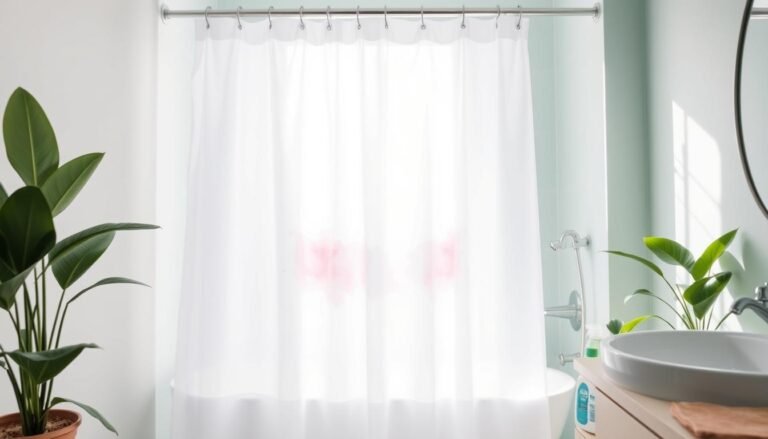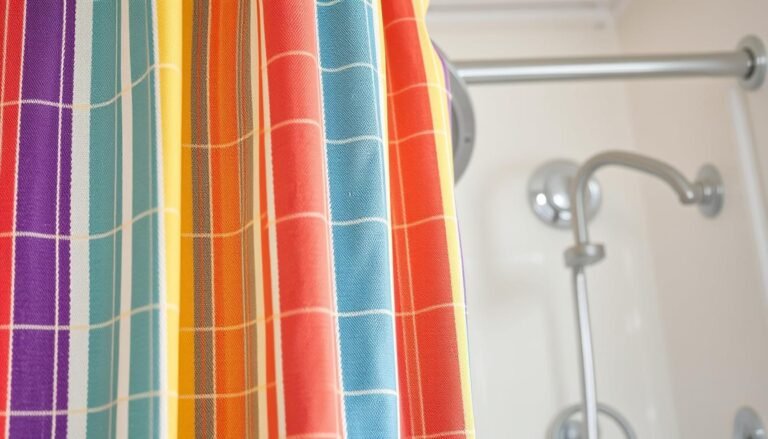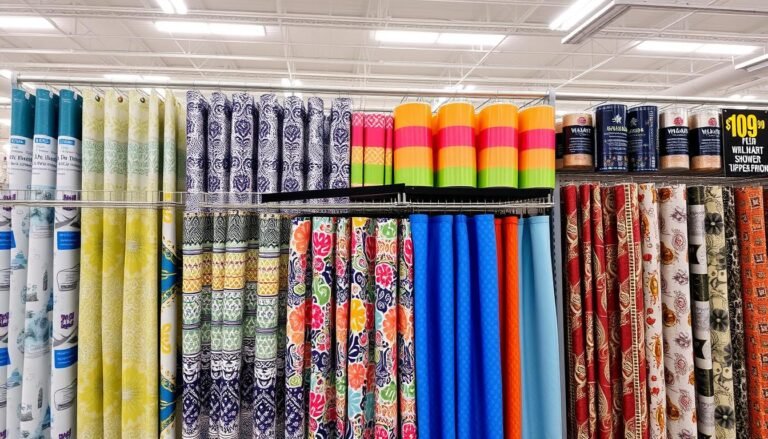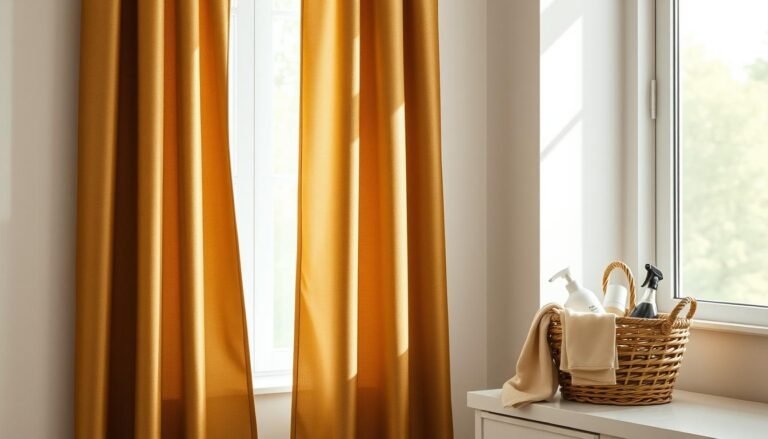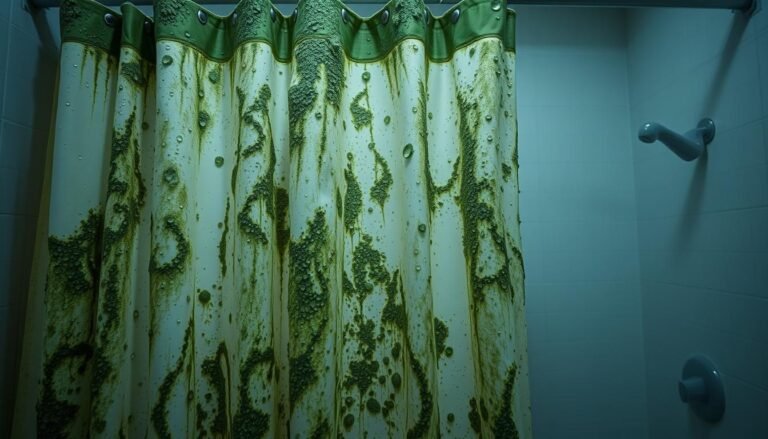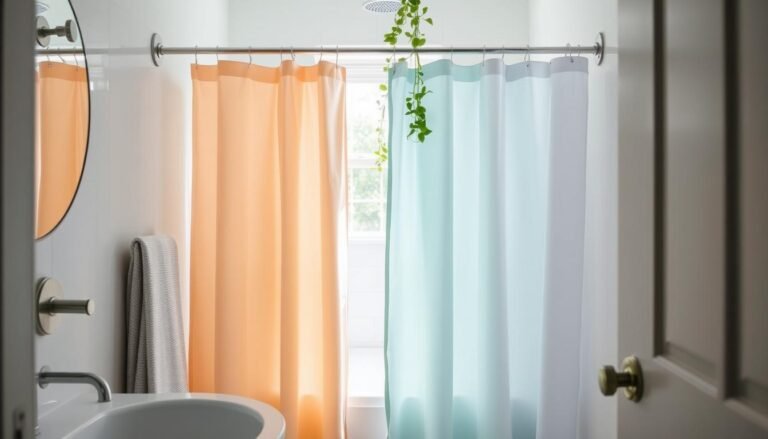Does Polyester Shower Curtain Need Liner? Find Out!
Wondering if your waterproof polyester shower curtain needs a liner? It’s important to look at a few key points. Polyester is great at repelling water and dries quickly. Sometimes, it works well on its own in a bathroom. But, adding a liner might be a good idea for a few reasons. It can offer more protection during showers, keep mold and mildew away, and help your curtain last longer.
Think about how your bathroom is used and your home’s specific conditions. Knowing the pros and cons will help you set up a bathroom that works well. It also means your polyester shower curtain will look good and last longer.
Understanding Polyester Shower Curtains
Polyester shower curtains are popular in modern bathrooms. They combine practicality with style. They are durable, water-resistant, and perfect for homes or businesses. Unlike natural fabrics, polyester keeps a sleek look through daily use.
Material Characteristics
Polyester is a synthetic material that feels like fabric but without the downsides. It resists creases and shrinking, looking good over time. It’s non-flammable and resists quick ignition, making your bathroom safer. Plus, it dries fast, thanks to its moisture-resistant nature.
Water Resistance and Durability
Polyester shower curtains stand out for their water resistance. They keep water in the shower, serving as the best shower curtain liner alternative. Polyester dries quickly, preventing mold and mildew. They’re durable, handling regular washes without damage.
Common Uses in Bathrooms
Polyester curtains are common in busy bathrooms. They last a long time. Available in many colors, patterns, and styles, they easily match your decor. Whether you prefer simple or complex designs, there’s an option for you. They’re also affordable, making them a smart choice for a stylish, dry bathroom.
Does Polyester Shower Curtain Need Liner?
Wondering if a polyester shower curtain needs a liner? Polyester is known for being water-resistant and durable. This makes them last long even with everyday use. The main question is, does a polyester shower curtain need a?
Polyester shower curtains don’t really need a liner because they’re made strong and repel water. But, adding a liner can help keep your shower cleaner. It also fights against mildew, which is key in damp bathrooms.
There are many kinds of shower curtain liners available. Some liners are weighted to stay in place, while others fight against mildew. Vinyl liners are cheap and easy to take care of. Meanwhile, nylon and polyester ones can be washed, which helps keep your bathroom fresh and clean.
Polyester shower curtains usually measure 72 inches by 72 inches. But, there are longer ones for bigger bathrooms. You can find them in many styles, from simple colors to cool patterns. This means you can pick one that matches your bathroom’s look. Whether you use a liner or not, keeping your shower area clean matters most. Liners help a lot with this.
| Material | Features | Maintenance |
|---|---|---|
| Polyester | Durable, waterproof | Machine washable |
| Vinyl | Affordable, low-maintenance | Disposable |
| Cotton | Luxurious, durable | Monthly washing |
Even though polyester shower curtains work well on their own, using a liner boosts mildew prevention and shower cleanliness. Think about what you need and want to make the best choice for your bathroom.
Benefits of Using a Shower Curtain Liner
A shower curtain liner is key for a better bathroom. It protects and makes your shower look good. It keeps your actual curtain clean and adds style to your space.
Protection Against Mold and Mildew
Using a liner fights mold and mildew. These grow in wet places. A liner stops them from reaching your bathroom, making it clean and safe.
Preservation of Shower Curtain Material
Liners also save your shower curtain. Water and soap can wear it out. But a liner shields it, making it last longer. Especially for polyester curtains, this is a big help.
Enhanced Aesthetic Appeal
Liners improve your shower’s look. They let you mix textures and patterns. You can pick a clear one to show off a nice curtain or a patterned one to add style.
Using a liner with a polyester curtain is smart. It’s affordable and looks great. Polyester curtains look nice and last long, perfect for a budget-friendly update.
| Type of Shower Curtain | Material Characteristics | Recommended Use |
|---|---|---|
| Polyester | Waterproof, durable, easily washable, fabric-like appearance | Affordable and versatile solution for most bathrooms |
| Vinyl | Cheap, low-maintenance, waterproof | Long-lasting and easy-to-clean option |
| Cotton | Luxurious feel, more expensive, moisture-absorbent | Premium choice offering classic comfort and an inviting touch |
Mildew Resistant Shower Curtains: What You Need to Know
Picking the right shower curtain is key for a clean bathroom. Mildew-resistant curtains help stop mold and keep your shower looking good. Caring for your shower curtain properly makes it last longer and stay nice.
Choosing the Right Materials
The material of your shower curtain matters a lot. Polyester is great for resisting mold and is easy to wash. You could also choose vinyl, which costs less but isn’t as tough, or go with PEVA or EVA liners. These are better for the planet than PVC and release fewer harmful chemicals.
- Polyester: Naturally resistant to mold and mildew; available in various colors.
- Vinyl: Affordable and easy to clean but may emit toxic odors.
- PEVA/EVA: Chlorine-free, eco-friendly, and a healthier choice for you and your family.
Maintenance Tips for Mildew-Free Shower Curtains
Keeping your shower curtain clean is important. Here’s how to do it:
- Regular Washing: Wash your curtain every month with hot water, vinegar, and baking soda to keep it mildew-free.
- Dry Thoroughly: Make sure it dries completely each time you use it. Spread it out to let it air dry.
- Use Antimicrobial Treatments: Use sprays or tea tree oil to fight off mold.
- Ventilation: Airing out your bathroom cuts down on moisture, stopping mildew before it starts.
By picking the right curtain and taking care of it, you’ll have a bathroom that’s both clean and healthy. Consistent maintenance keeps your curtain looking great and makes your home healthier.
Polyester vs. Plastic Shower Curtain Liners
When deciding between polyester and plastic shower liners, consider their durability, impact on the environment, and appearance. Getting to know the good and bad about each can steer you towards more green bathroom options.
Pros and Cons of Polyester Liners
Polyester liners are long-lasting and look more like fabric. They resist mildew better and can make your bathroom look nicer. They’re also safer because they don’t give off harmful chemicals.
- Pros:
- Durable and long-lasting
- Less prone to mildew
- More aesthetically pleasing
- Eco-friendly bathroom options as it is machine washable
- Cons:
- Higher cost compared to plastic
- Requires regular washing to maintain appearance and hygiene
Pros and Cons of Plastic Liners
Plastic liners are usually cheaper than polyester ones. They’re made from PEVA or PVC and block water well. Yet, they’re not great for the planet and can release harmful chemicals.
- Pros:
- More affordable
- Effective water resistance
- Easy to clean
- Available in various designs
- Cons:
- May release toxic chemicals
- Less durable than polyester
- Not eco-friendly
- Can become brittle over time
Choosing depends on what matters most to you: health, cost, or durability. Polyester is more eco-friendly but pricier. On the other hand, plastic liners are cheaper and might work if you plan to replace them often.
For more home improvement tips and green bathroom advice, check out this guide on patio planning permissions.
How to Care for Polyester Shower Curtains
To keep your polyester shower curtain looking and working great, you need to clean and dry it regularly. They are strong and can be cleaned in the washing machine, which makes them easy to look after. Start by washing your curtain on a gentle cycle with warm water.
When cleaning a polyester shower curtain, it’s best to avoid chlorinated bleach. This can make the curtain yellow and might make it wear out faster. Use vinegar or baking soda instead because they’re safer but still work well. To tackle mildew or hard stains, try spraying a mix of water and distilled white vinegar on them.
Make sure the curtain dries well after each use to stop mold from growing. Having an extra curtain is helpful so you can use one while the other is being washed. For detailed advice on cleaning both plastic and polyester curtains, check out this helpful article. Spending time each month for a deep clean can help keep your bathroom smelling and looking good.

Hey there, I’m Alex Hanson and I’m passionate about all things covers! Whether you’re looking for a car seat cover to protect your vehicle or an oven cover to keep your kitchen clean, I’m here to help. With years of experience in the industry, I have plenty of knowledge and insights to share with my readers. So, if you care about protecting your belongings and making them look their best, you’re encouraged to read my blog as I explore the perfect cover for every need.


